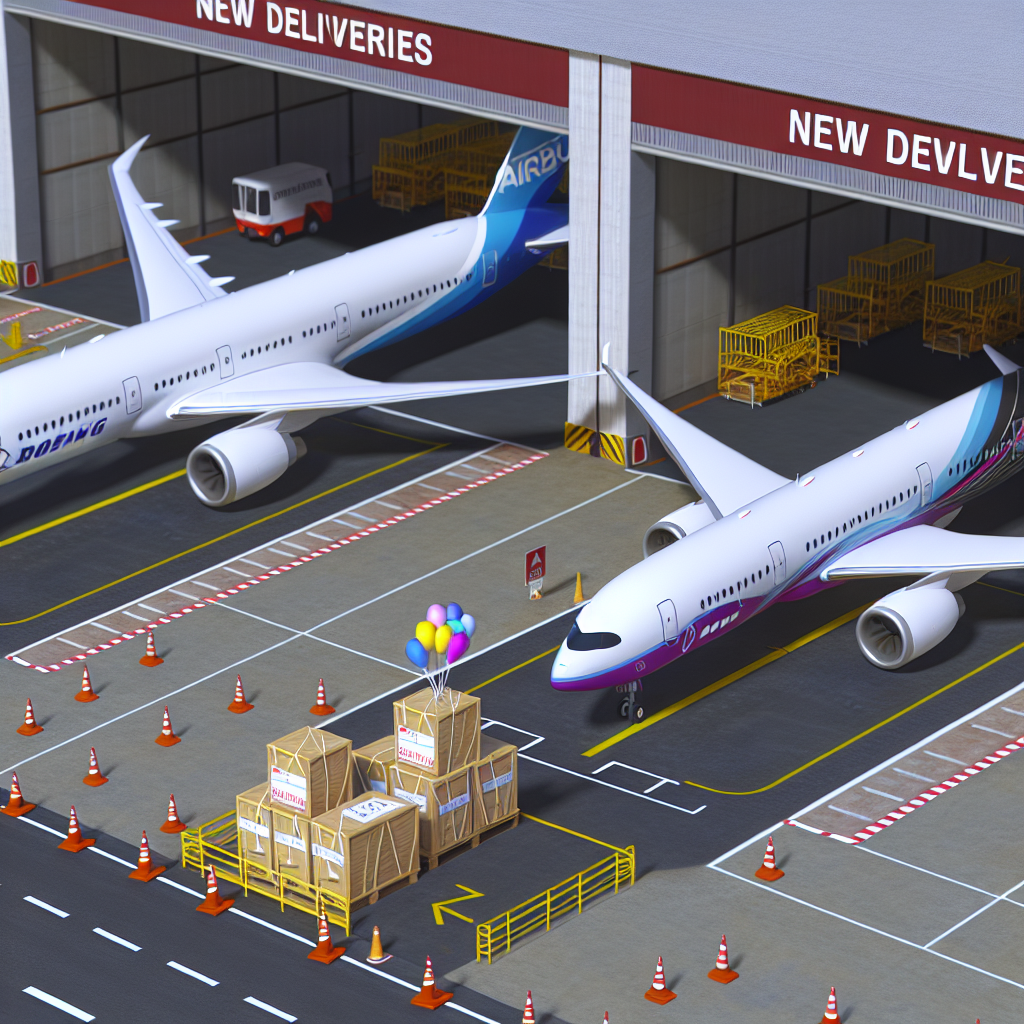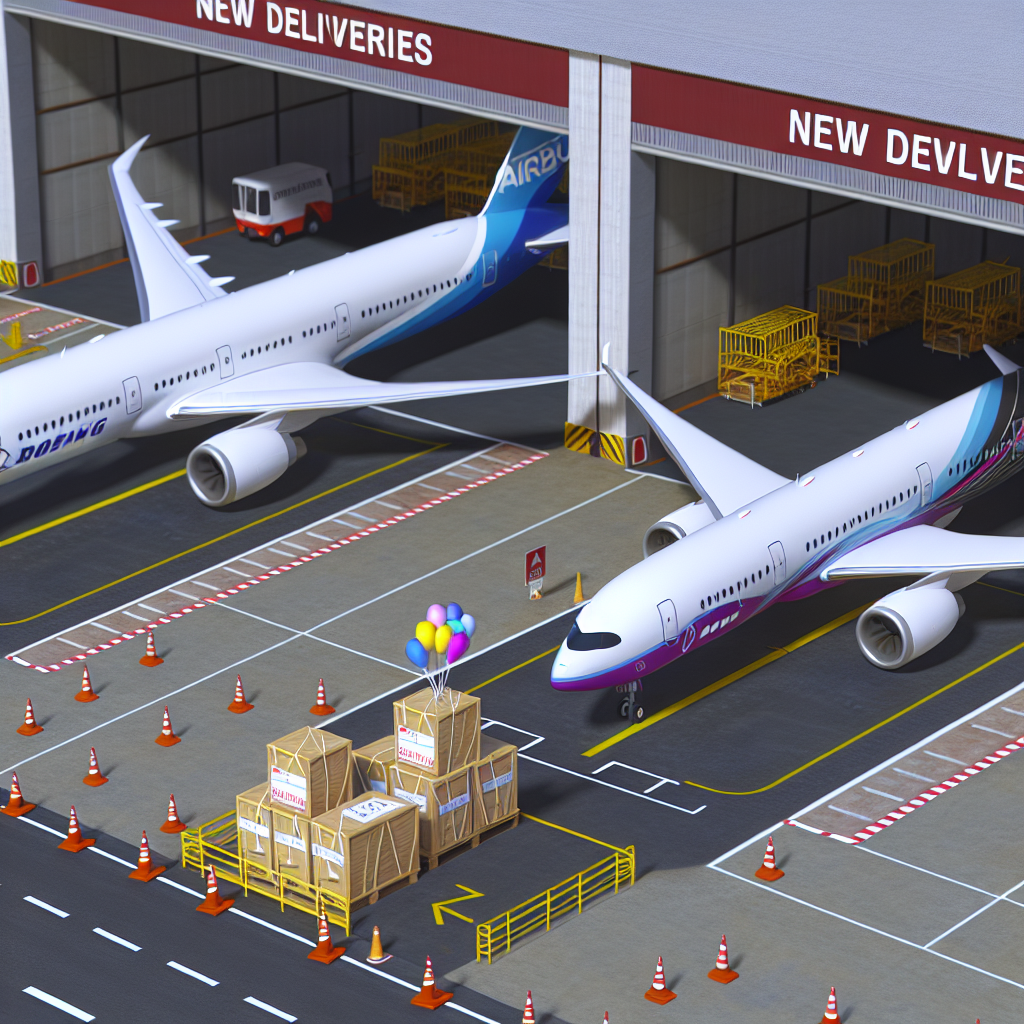TOULOUSE— Airbus has achieved the remarkable milestone of delivering approximately 300 aircraft by mid-2025, surpassing Boeing’s total of around 278 units. This impressive delivery performance showcases Airbus’ consistent production levels at its Toulouse and Hamburg facilities, despite ongoing challenges related to engine shortages.
On the other hand, Boeing is gradually enhancing its delivery rate but is still facing hurdles due to regulatory scrutiny, quality control issues, and several significant safety incidents, including a tragic crash involving Air India (AI) that occurred earlier this year.

As of June 2025, the rivalry in global aircraft manufacturing remains intense, with Airbus holding an advantage on the scoreboard.
Data from Forecast International reveals that Airbus delivered an estimated 300 aircraft by the end of June, which includes 243 confirmed deliveries through May and 57 in June.
Boeing closely followed with around 278 aircraft, made up of 220 deliveries through May and approximately 58 in June, allowing it to momentarily outpace Airbus in monthly deliveries.
Despite this uptick, Boeing’s single-month advantage did little to mitigate the cumulative lead established by Airbus earlier in the year. Airbus maintained its delivery momentum largely through its A320neo family, A350s, and A220s, delivering 34, 8, and 11 units, respectively, in June.
Boeing achieved its June surge primarily through 737 MAX and 787 Dreamliner models, yet issues related to FAA oversight, manufacturing discrepancies, and door plug inspections limited its overall output compared to Airbus.
Boeing’s Second-Quarter 2025 Deliveries Surge
Boeing successfully delivered 150 commercial aircraft in Q2 2025, representing a 15% increase from Q1 and marking its strongest second quarter since 2018. This boost in deliveries included a revival of shipments to China alongside robust production of the Boeing 737 MAX.
Deliveries to Chinese airlines resumed in June and included significant shipments to Xiamen Airlines, China Southern, Air China, and Minsheng Financial Leasing, with most departing from Seattle (SEA), Boeing’s main delivery center.
In total, Boeing’s commercial aircraft deliveries reached 280 units in the first half of 2025, propelled by enhanced production across all widebody and narrowbody programs. In the period between April and June, Boeing delivered 104 737s, 24 787s, 13 777s, and 9 767s. Notably, June alone saw the company delivering 60 aircraft, its highest monthly total since December 2023.
The 787 Dreamliner program observed nearly a doubling of deliveries from Q1 to Q2, with 24 units shipped, up from 13 in the first quarter.
This increase followed the easing of trade tensions between the U.S. and China, leading to the delivery of eight aircraft—primarily 737 MAXs—to Chinese airlines. Juneyao Air (HO) received a deferred 787-9, while Air China Cargo (CA) accepted delivery of a 777 Freighter.
Quarterly Performance and Order Insights
Boeing’s Q2 production represented a 15% increase over the 130 aircraft delivered in Q1. Notably, widebody deliveries nearly saw a doubling:
| Aircraft | Q1 | Q2 | YTD |
|---|---|---|---|
| 737 | 105 | 104 | 209 |
| 767 | 5 | 9 | 14 |
| 777 | 7 | 13 | 20 |
| 787 | 13 | 24 | 37 |
| Total | 130 | 150 | 280 |
In addition to strong delivery numbers, Boeing secured 427 aircraft orders in Q2, a significant recovery from the 25 orders received during the same period in 2024. Notably, May witnessed 303 gross orders being noted, marking the company’s highest monthly total since 2023.
A standout order was made by Qatar Airways (QR), which verified a historic request for 160 aircraft—comprising 130 Boeing 787 Dreamliners and 30 777-9s—with options for an additional 50 units.
Full Capacity Production of 737 MAX
Boeing is maintaining a production capacity of 38 737 MAX aircraft per month, as stipulated by the FAA following the January 2024 incident involving an Alaska Airlines (AS) door plug. Subsequently, Boeing has made significant investments to enhance quality control and safety protocols.
In its most recent Chief Aerospace Safety report, improvements have been noted across all six safety and quality standards.
CEO Kelly Ortberg expresses optimism that production could potentially rise to 42 jets per month pending FAA approval. Executives stress their focus on sustaining high production quality while meeting global delivery commitments.
Regulatory Pressures Affecting Boeing’s Progress
Boeing’s production delays throughout 2025 cannot be attributed solely to supply chain issues. The company’s safety history has been subjected to intense scrutiny following a series of incidents.
Most noticeably, Air India Flight AI171, which was operated by a Boeing 787-8, tragically crashed, resulting in 241 fatalities. This event shone a light on safety concerns regarding the 787 model.
Additionally, earlier in the year, a United Airlines (UA) 787 experienced a violent pitch-down due to a faulty pilot seat mechanism, further undermining public trust.
Reports of smoke in the cabin of certain 737 MAX aircraft, as reported by Bloomberg, have compounded Boeing’s safety challenges, overshadowing its otherwise improving delivery metrics.
In response, Boeing has initiated leadership changes and is actively collaborating with the Federal Aviation Administration (FAA) to improve inspections and restore operational reliability; however, rebuilding its reputation is proving more challenging than simply logistics recovery.
Airbus Established with Operational Consistency
Airbus, with its assembly lines located in Toulouse (TLS) and Hamburg (XFW), has exhibited a remarkable ability to withstand comparable challenges.
Despite facing engine shortages, especially concerning Pratt & Whitney PW1000G engines, which have temporarily grounded numerous jets, Airbus has consistently maintained an average monthly output of around 50 aircraft.
The manufacturer efficiently utilizes its global supply chain and cross-program synergies to stabilize deliveries across a range of products. Their approach emphasizes gradual production increases while reducing dependence on any single supplier or program.
The A220 and A350 programs, while not as substantial as the A320neo, have each contributed significantly to the overall delivery totals for Airbus.
Stay connected for updates. Follow us on social media for the latest news.
Join our Telegram Group for the latest aviation news. Also, follow us on Google News for more information.
Based on an article from aviationa2z.com: https://aviationa2z.com/index.php/2025/07/09/boeing-beats-airbus-in-june-2025-deliveries/?utm_source=rss&utm_medium=rss&utm_campaign=boeing-beats-airbus-in-june-2025-deliveries



